Renewable Energy Sources
Solving Energy Woes: Renewable Heat Pumps Efficiency
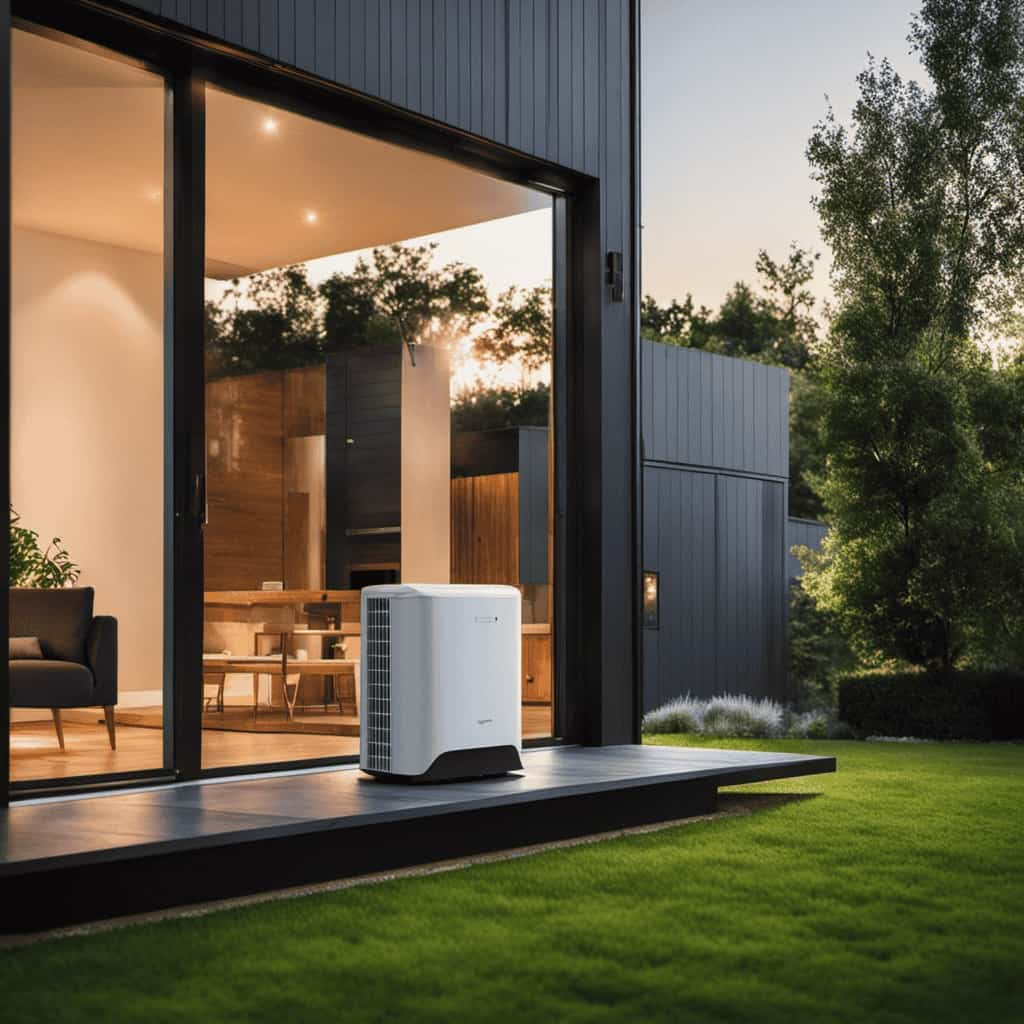
Fed up with steep utility bills and the ecological consequences of conventional heating solutions? Search no more!
In our article, we delve into the innovative solution of renewable heat pumps. These efficient systems not only save you money but also reduce your carbon footprint.
We analyze the basics, explore different types, and discuss factors affecting efficiency.
Join us as we uncover the secrets to solving your energy woes with renewable heat pumps.
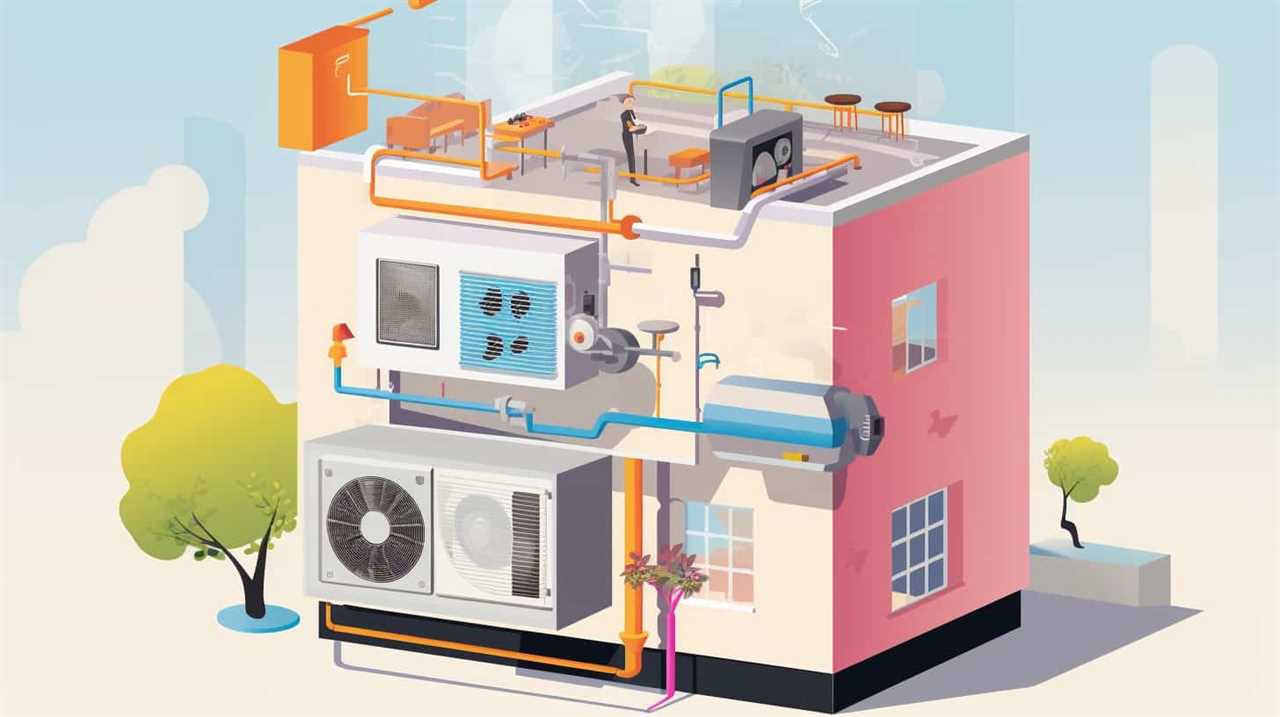
Key Takeaways
- Renewable heat pumps are highly energy-efficient, generating more heat energy than the electrical energy they consume.
- They can provide heating, cooling, and hot water, making them versatile and cost-effective.
- Different types of renewable heat pumps include air source, ground source, and water source heat pumps, each with their own advantages and limitations.
- Proper system sizing and correct installation techniques are crucial for optimal efficiency and to avoid energy losses.
The Basics of Renewable Heat Pumps
We’ll start by explaining how renewable heat pumps work.
Renewable heat pump technology utilizes the principle of extracting heat from the environment, such as the air, ground, or water, and transferring it to heat buildings or water. This process is achieved through the use of a refrigerant that absorbs heat from a low-temperature source and releases it at a higher temperature.
One of the advantages of renewable heat pumps is their high energy efficiency, as they can generate more heat energy than the electrical energy they consume. Additionally, they’re capable of providing heating, cooling, and hot water, making them versatile and cost-effective solutions for residential and commercial applications.
However, there are also some disadvantages to consider. Renewable heat pumps require a significant upfront investment, and their efficiency can be affected by extreme temperatures or inadequate insulation. Nonetheless, ongoing advancements in renewable heat pump technology continue to enhance their performance and overcome these challenges, making them a promising option for sustainable heating and cooling solutions.

Understanding the Energy Saving Potential
To fully grasp the energy saving potential of renewable heat pumps, we need to understand how they efficiently utilize and transfer heat from the environment.
Renewable heat pumps work by extracting heat from renewable sources such as the air, ground, or water, and transferring it to a building for space heating or hot water.
This process is accomplished through the use of refrigerants and a compressor. The heat pump increases the temperature of the extracted heat and delivers it to the building at a higher temperature, providing heating or hot water.
The energy saving potential of renewable heat pumps lies in their ability to harness heat from natural sources, rather than relying solely on fossil fuels.

This not only reduces greenhouse gas emissions, but also offers long-term cost effectiveness by reducing energy consumption and dependence on traditional heating systems.
Exploring Different Types of Renewable Heat Pumps
There are three main types of renewable heat pumps that are commonly used: air source heat pumps, ground source heat pumps, and water source heat pumps. Air source heat pumps utilize the outside air as a heat source, while ground source heat pumps extract heat from the ground. Water source heat pumps, on the other hand, extract heat from bodies of water. Each type of heat pump has its own advantages and limitations.
Air source heat pumps are the most commonly used due to their lower installation costs and ease of installation. However, they’re less efficient in colder climates and may require additional heating systems to supplement their performance.
Ground source heat pumps, also known as geothermal heat pumps, offer the advantage of stable temperature conditions underground, resulting in higher efficiency.
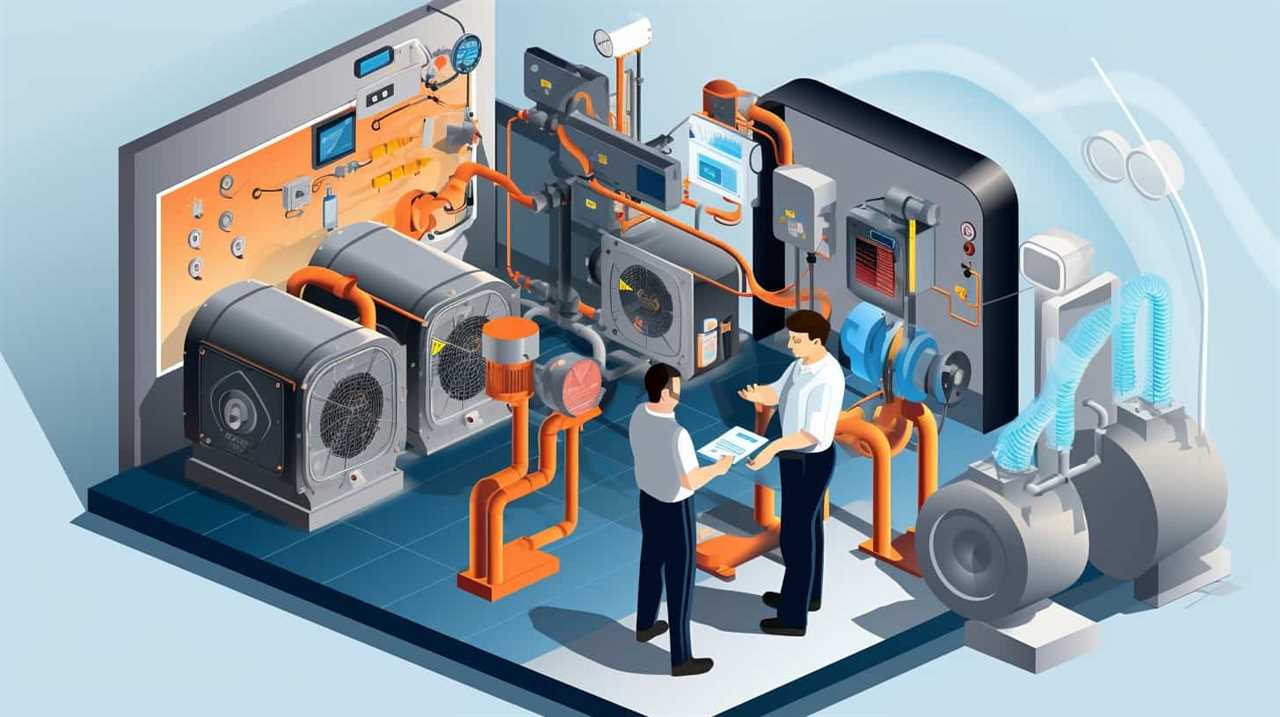
Water source heat pumps are similar to ground source heat pumps but utilize bodies of water as a heat source.
Understanding the different types of renewable heat pumps is crucial in determining the most suitable option for your specific needs. Factors such as sizing and installation will be discussed in the subsequent section, as they greatly affect the efficiency of these heat pump systems.
Factors Affecting Efficiency: Sizing and Installation
When it comes to optimizing the efficiency of renewable heat pumps, two crucial factors come into play: proper system sizing and correct installation methods.
Sizing the system accurately ensures that it can meet the heating demands of the space efficiently, while avoiding wasteful energy consumption.
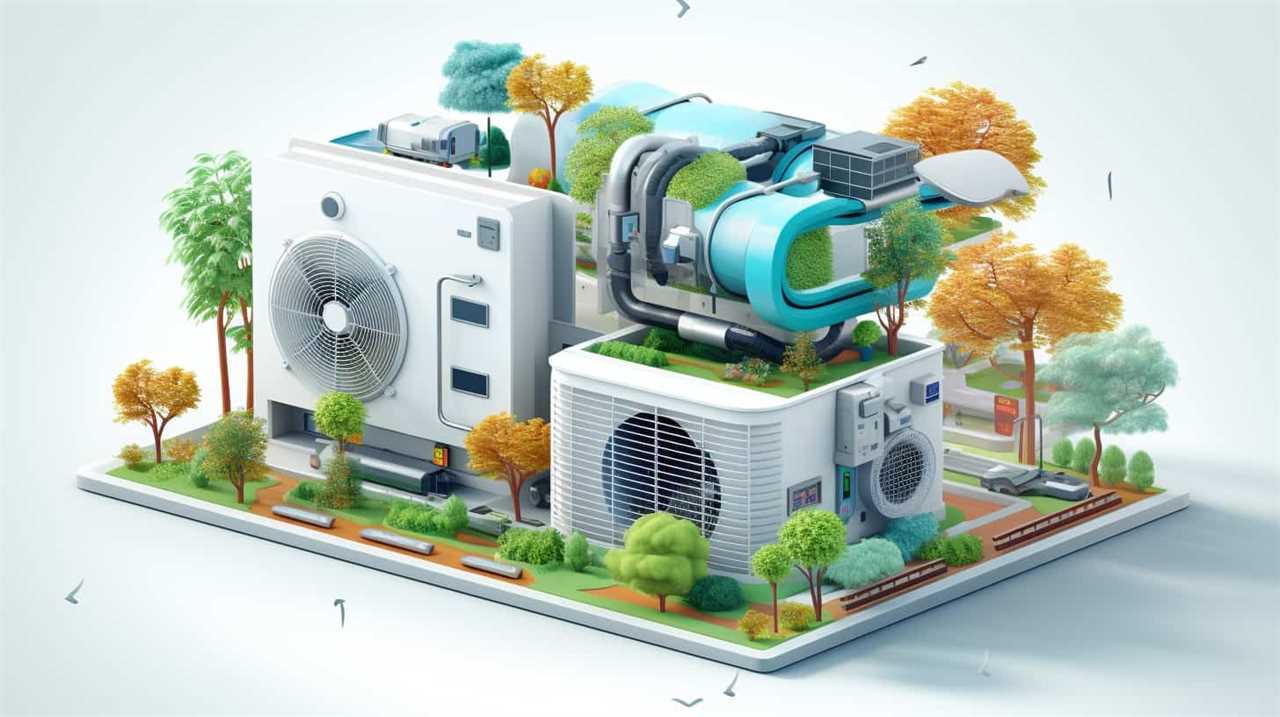
Additionally, correct installation techniques ensure that the heat pump operates at its optimal performance level, minimizing energy losses and maximizing its efficiency.
Proper System Sizing
We recommend calculating the proper system size to ensure optimal efficiency of the renewable heat pump. Proper system sizing is crucial in achieving maximum energy savings and reducing overall energy consumption.
Here are some factors to consider when determining the size of the heat pump system:
-
Building insulation: The level of insulation in the building affects the heating and cooling load, which in turn impacts the size of the heat pump required.
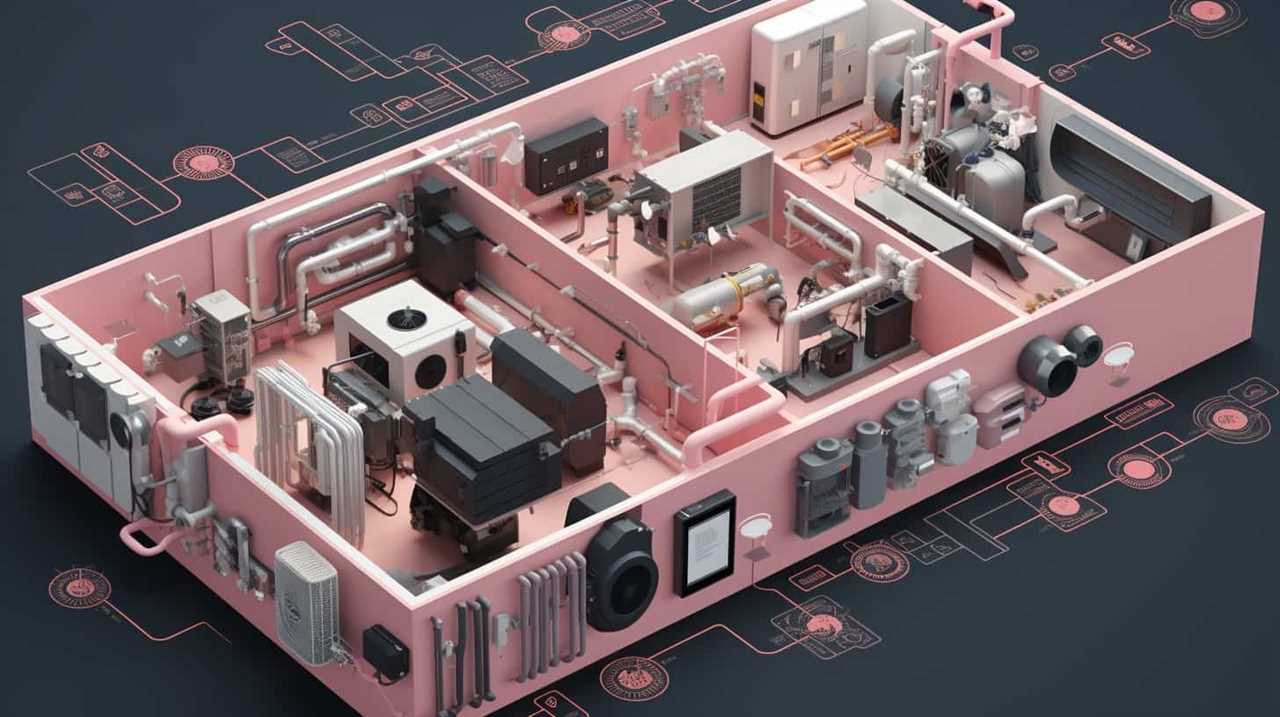
-
Climate conditions: The local climate plays a significant role in determining the heating and cooling requirements. Extreme temperatures may necessitate a larger heat pump to meet the demand.
-
Occupancy and usage: The number of occupants and their activities within the building influence the heat load. Factors such as the number of rooms, appliances, and hot water usage must be considered.
Correct Installation Methods
To ensure optimal efficiency of the renewable heat pump, we must carefully consider factors such as sizing and installation methods. Proper installation techniques are crucial for the performance and longevity of the system. When installing a renewable heat pump, it is important to follow manufacturer guidelines and industry best practices. Common issues can arise from improper installation, such as inadequate heat transfer, refrigerant leaks, or electrical faults. Troubleshooting these issues can be time-consuming and costly. Therefore, it is essential to hire qualified professionals who have expertise in renewable heat pump installation. By adhering to correct installation methods, we can minimize potential problems and maximize the efficiency of the system. Now let’s explore how we can further enhance efficiency through proper maintenance.
| Installation Techniques | Troubleshooting Common Issues |
|---|---|
| Proper refrigerant charge | Inadequate heat transfer |
| Correct electrical wiring | Refrigerant leaks |
| Properly sized ductwork | Electrical faults |
| Adequate insulation |
Maximizing Efficiency Through Proper Maintenance
Regular maintenance is crucial for optimizing the efficiency of renewable heat pumps. By performing routine maintenance tasks such as cleaning the filters, checking refrigerant levels, and inspecting electrical connections, homeowners can ensure that their heat pumps are operating at peak performance.

Additionally, implementing energy-saving maintenance tips like proper insulation and regular system checks can further enhance the overall efficiency of the heat pump, leading to significant energy savings and lower utility bills.
Regular Maintenance Benefits
By performing regular maintenance on our renewable heat pumps, we can maximize their efficiency and ensure optimal performance. To achieve this, it’s essential to follow a regular maintenance checklist to keep our heat pumps in top condition. This includes tasks such as cleaning or replacing air filters, inspecting and cleaning coils, checking refrigerant levels, and lubricating moving parts.
Importance of professional maintenance:
- Regular inspections by trained professionals can identify potential issues before they become major problems, preventing costly repairs and downtime.
- Professionals have the expertise to perform more complex maintenance tasks, such as checking electrical connections and calibrating controls, ensuring the heat pump operates at peak efficiency.
- Professional maintenance helps maintain the manufacturer’s warranty, providing peace of mind and protection against unexpected expenses.
Energy-Saving Maintenance Tips
Let’s focus on maintaining our renewable heat pumps to maximize efficiency and save energy.
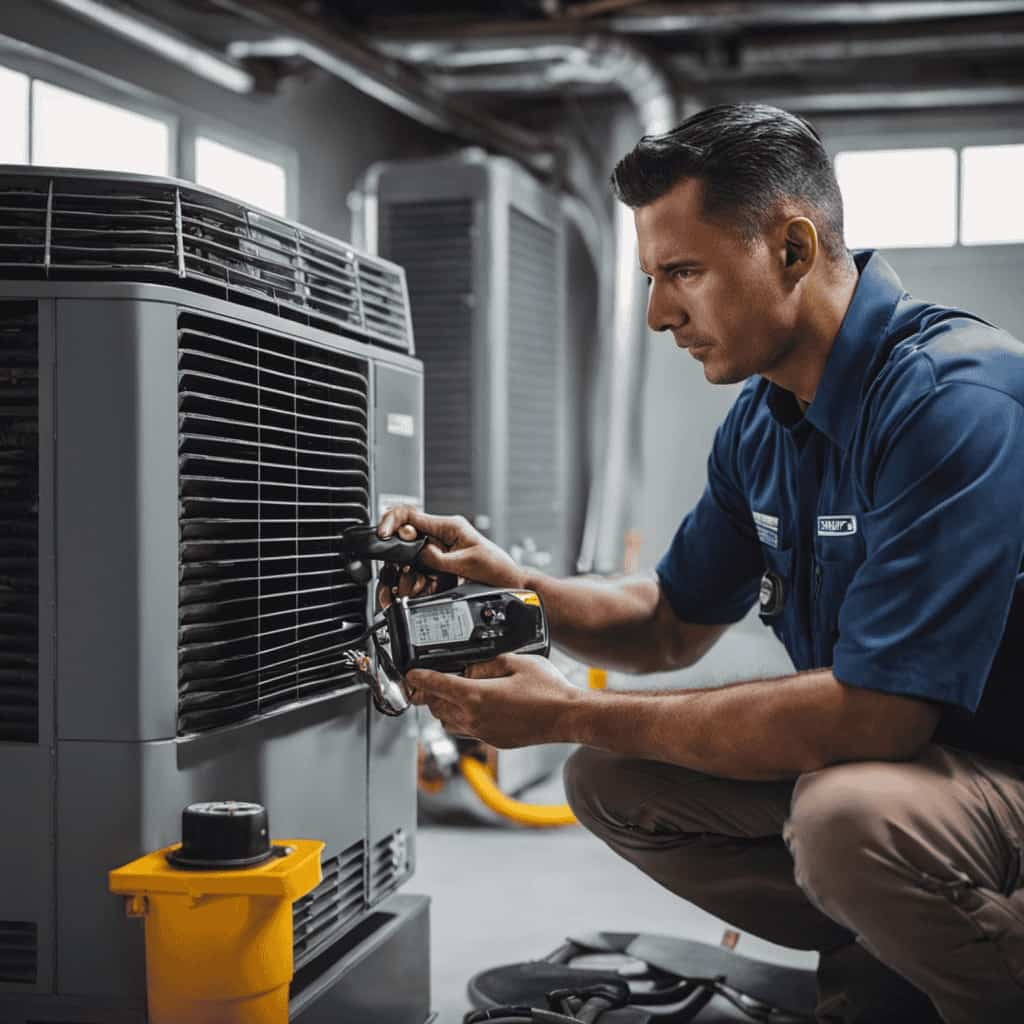
By following a few energy-saving techniques and troubleshooting tips, we can ensure that our heat pumps are operating at their highest level of performance.
Firstly, regularly cleaning and replacing air filters is crucial to prevent dust and debris buildup, which can hinder airflow and reduce efficiency.
Additionally, checking and cleaning the outdoor unit regularly helps to remove any leaves, dirt, or other obstructions that may impede its function.
It’s also important to inspect and seal ductwork to prevent air leaks, as these can lead to energy loss and decreased efficiency.
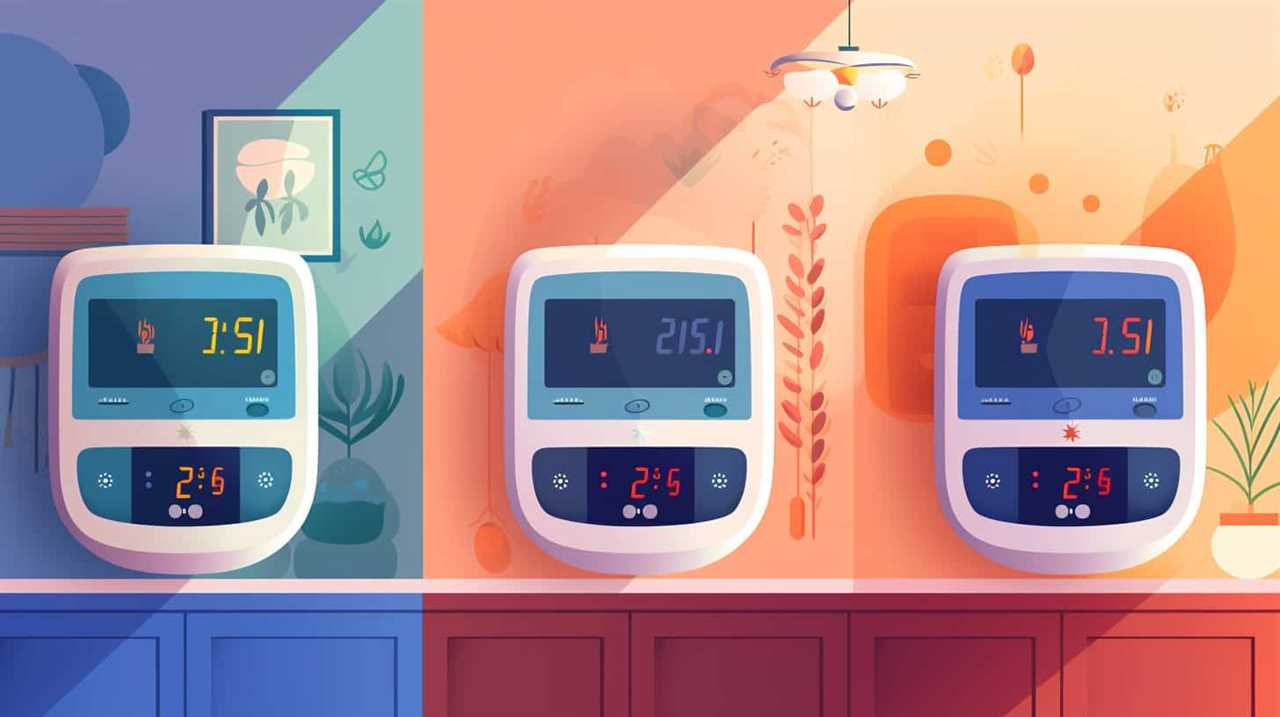
Lastly, scheduling regular maintenance with a qualified technician will help identify and address any potential issues before they escalate.
Optimizing Heat Pump Performance
To achieve optimal heat pump performance, we must prioritize maintenance and maximize efficiency through proper care. By implementing the following strategies, we can improve the performance and increase the effectiveness of heat pumps:
- Regularly clean and replace air filters to ensure proper airflow and prevent dust buildup.
- Schedule routine inspections by qualified technicians to identify and address any potential issues.
- Keep the outdoor unit clear of debris, such as leaves and twigs, to maintain unrestricted airflow.
These maintenance practices are essential for maximizing the efficiency of heat pumps, as they ensure that the system operates at its peak performance. By regularly monitoring and maintaining the heat pump, we can improve its overall performance, increase energy savings, and prolong its lifespan.
Now, let’s delve into comparing renewable heat pumps with traditional heating systems.
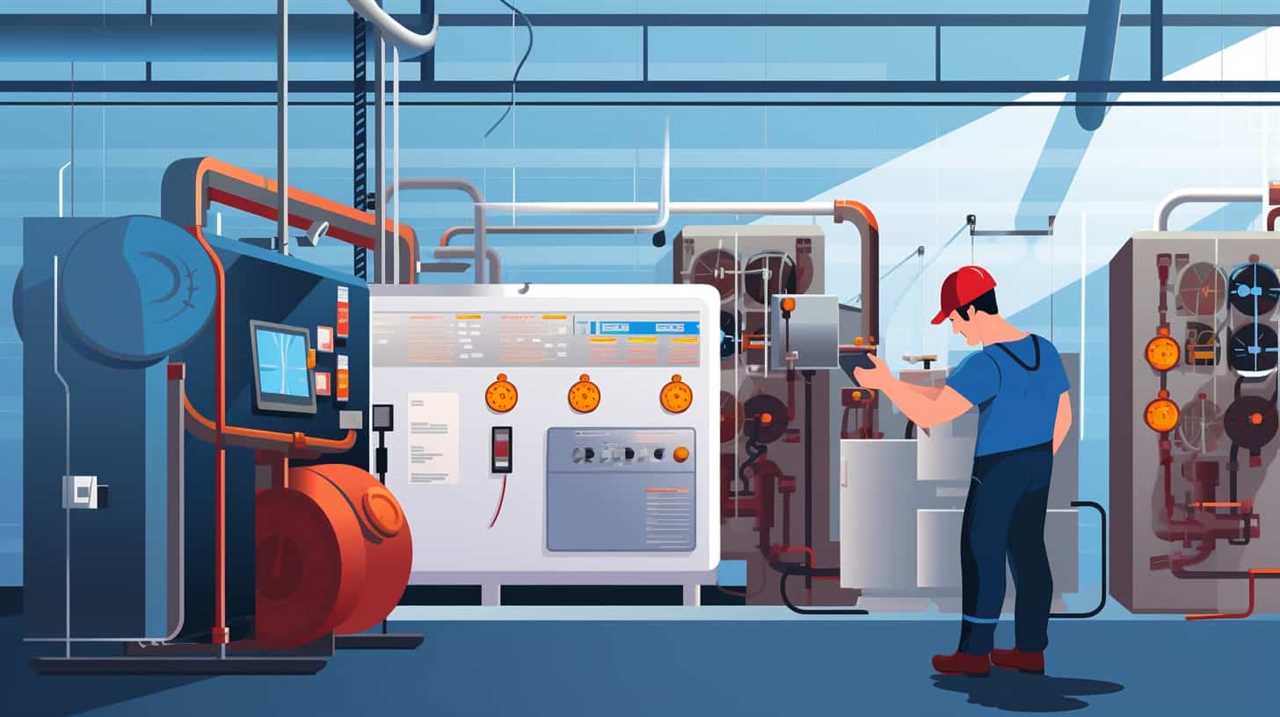
Comparing Renewable Heat Pumps With Traditional Heating Systems
The renewable heat pumps offer significant advantages over traditional heating systems in terms of efficiency and environmental impact. When comparing fuel efficiency, renewable heat pumps have been shown to outperform traditional systems by a wide margin. This is due to their ability to extract heat from the surrounding environment, such as the air or ground, and transfer it into the building.
Traditional heating systems, on the other hand, rely on the combustion of fossil fuels which results in significant energy loss and greenhouse gas emissions. In terms of environmental impact, renewable heat pumps have a much lower carbon footprint compared to traditional systems. They don’t produce any direct emissions and can be powered by renewable energy sources such as solar or wind.
Transitioning to renewable heat pumps is a crucial step towards reducing our reliance on fossil fuels and mitigating climate change.
Moving forward, we’ll discuss the challenges associated with adopting renewable heat pumps, specifically the cost and incentives required to make them more accessible to consumers.
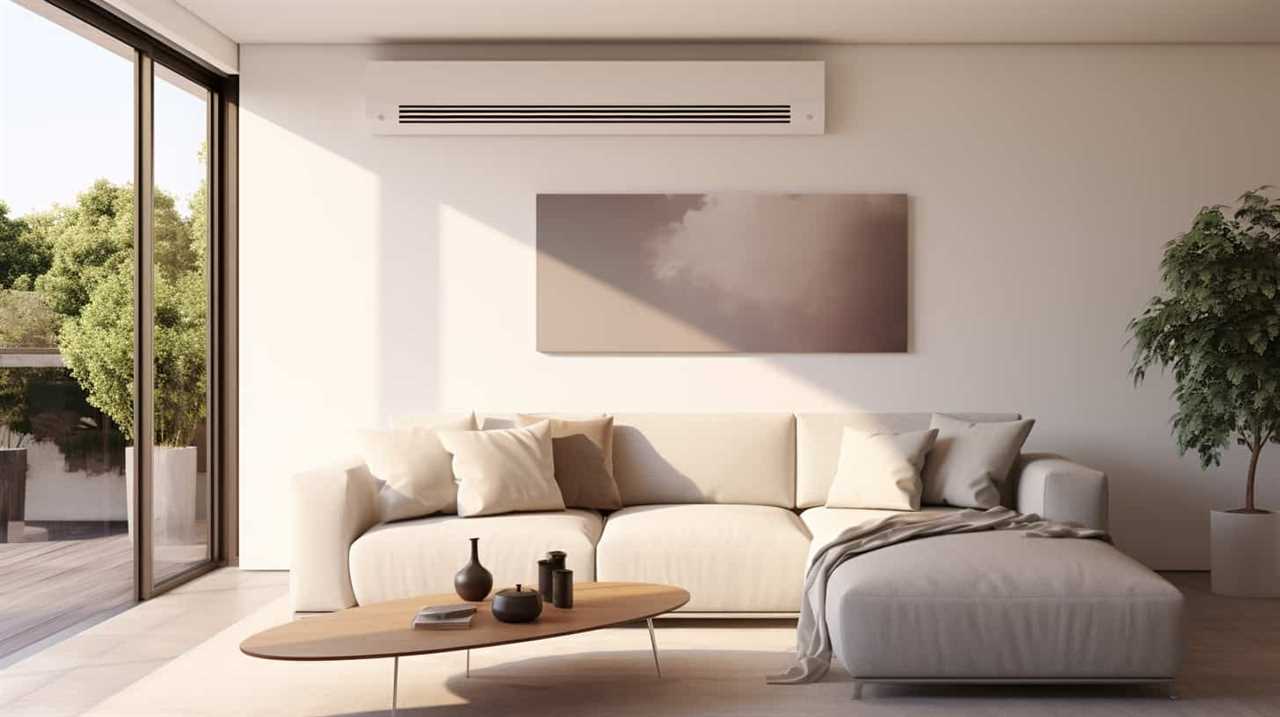
Overcoming Challenges: Cost and Incentives
We must address the issue of affordability and incentives in order to overcome the challenges associated with adopting renewable heat pumps. While these systems offer numerous benefits, such as lower carbon emissions and increased energy efficiency, the initial cost can be a major barrier for many homeowners. To encourage wider adoption, it’s crucial to emphasize the cost benefits associated with renewable heat pumps.
To overcome the cost challenge, it’s essential for governments to provide support and incentives. This can include financial assistance such as grants or subsidies, as well as tax credits or rebates. Government support plays a crucial role in making renewable heat pumps more accessible and affordable for homeowners.
In addition to financial incentives, raising awareness and providing education about the long-term savings and environmental benefits of renewable heat pumps can also encourage adoption. By highlighting the positive impact on both the environment and household budgets, we can overcome the cost barriers and drive the widespread adoption of renewable heat pumps.
Frequently Asked Questions
What Are the Different Types of Renewable Heat Pumps Available in the Market?
There are two main types of renewable heat pumps available in the market: geothermal heat pumps and air source heat pumps. These technologies harness the natural energy from the ground or air to efficiently heat and cool buildings.
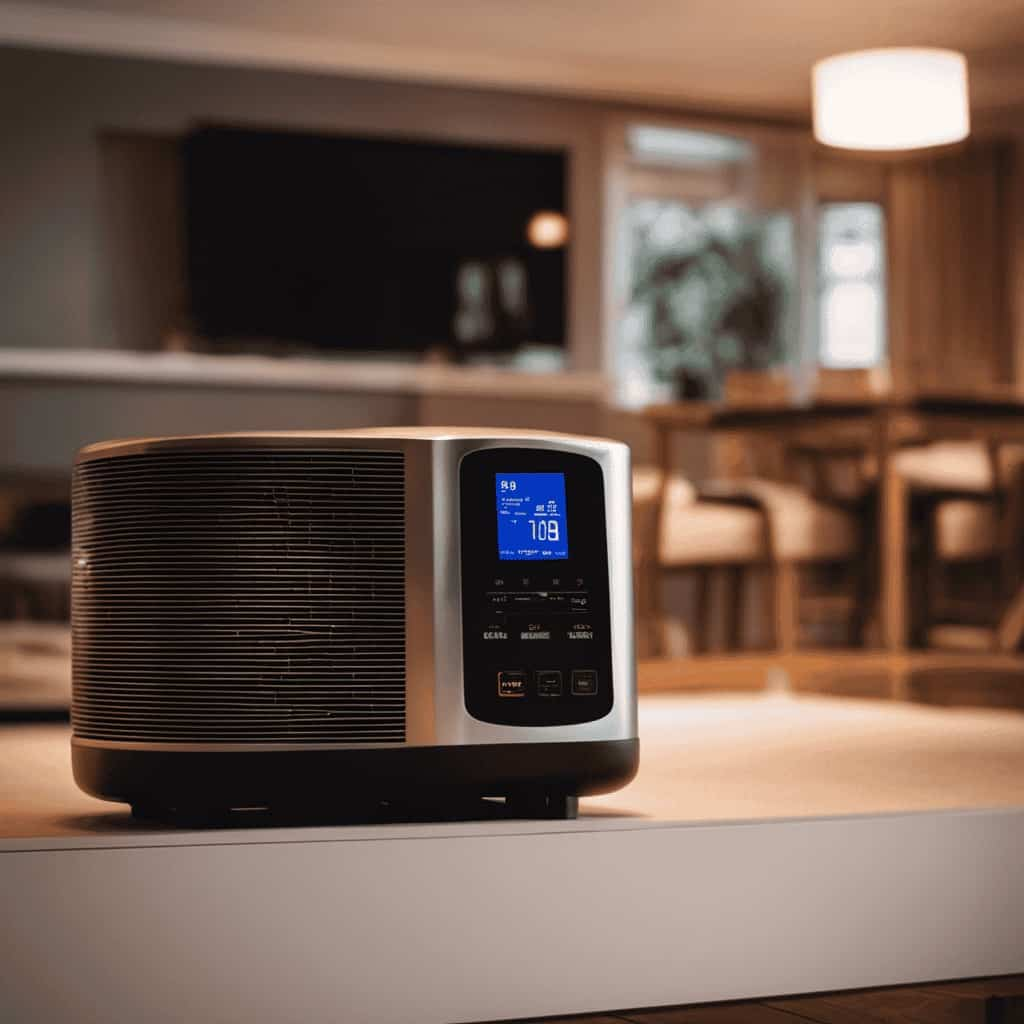
How Does the Sizing and Installation of a Renewable Heat Pump Affect Its Efficiency?
The sizing impact and installation techniques of a renewable heat pump significantly affect its efficiency. Properly sizing the heat pump ensures optimal performance, while correct installation techniques ensure efficient operation and maximum energy savings.
What Are Some Common Maintenance Practices That Can Help Maximize the Efficiency of a Renewable Heat Pump?
Regular maintenance practices are crucial for maximizing the efficiency of a renewable heat pump. By performing routine inspections, cleaning filters, and ensuring proper airflow, we can achieve optimal energy savings and prolong the lifespan of the system.
How Does the Efficiency of Renewable Heat Pumps Compare to Traditional Heating Systems?
When comparing the efficiency of renewable heat pumps to traditional heating systems, our analysis focuses on the comparison of energy consumption and the environmental impact. We aim to provide innovative solutions for a more sustainable future.
Are There Any Financial Incentives or Government Programs Available to Offset the Cost of Installing a Renewable Heat Pump?
Financial incentives and government programs can help offset the cost of installing renewable heat pumps. These initiatives aim to promote clean energy adoption and provide financial support to individuals and businesses investing in renewable heating technologies.
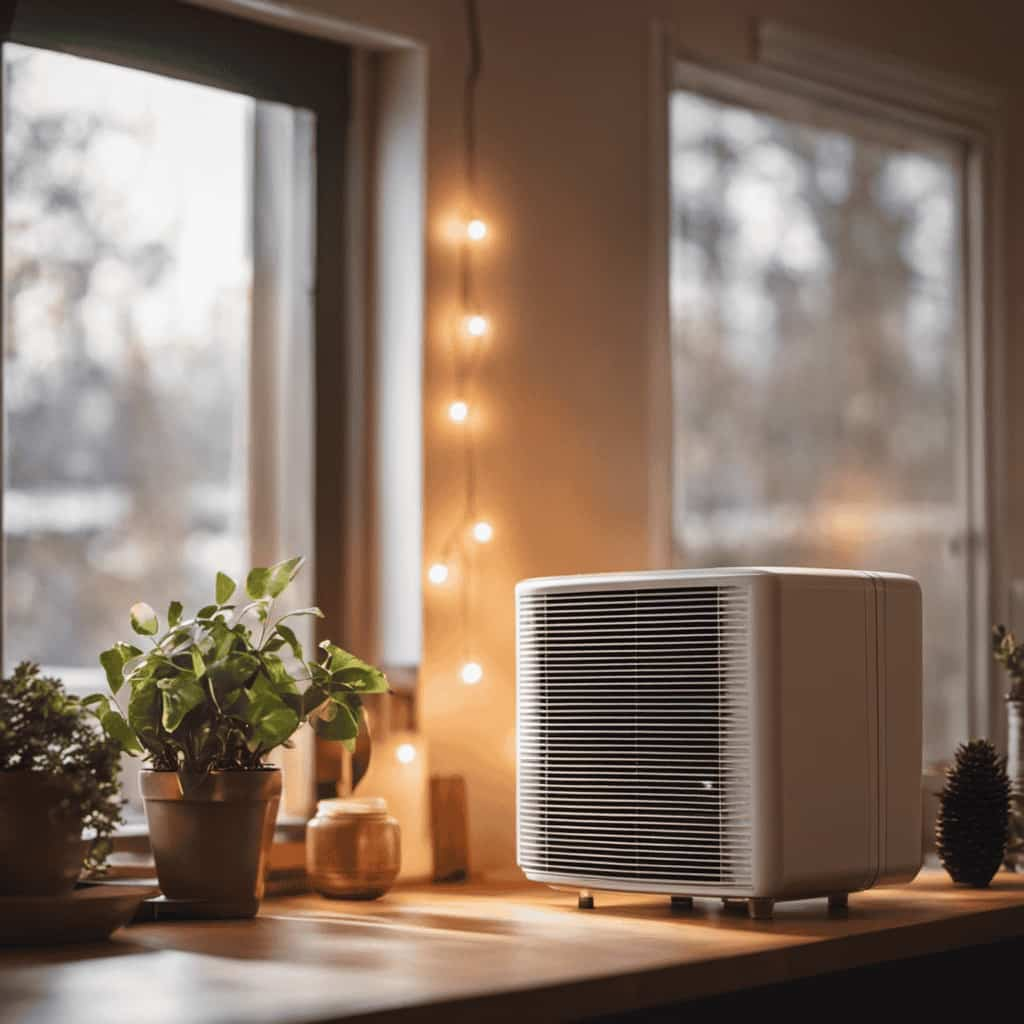
Conclusion
In conclusion, renewable heat pumps offer a promising solution to our energy woes. With their impressive energy-saving potential and a variety of options available, these pumps can efficiently heat our homes while reducing our carbon footprint.
By properly sizing, installing, and maintaining these pumps, we can maximize their efficiency and enjoy long-term cost savings.
So let’s embrace renewable heat pumps and say goodbye to traditional heating systems. It’s time to heat our homes in a way that’s both environmentally friendly and economically sound.
Renewable Energy Sources
5 Stellar Energy-Efficient Heat Pump HVAC Systems
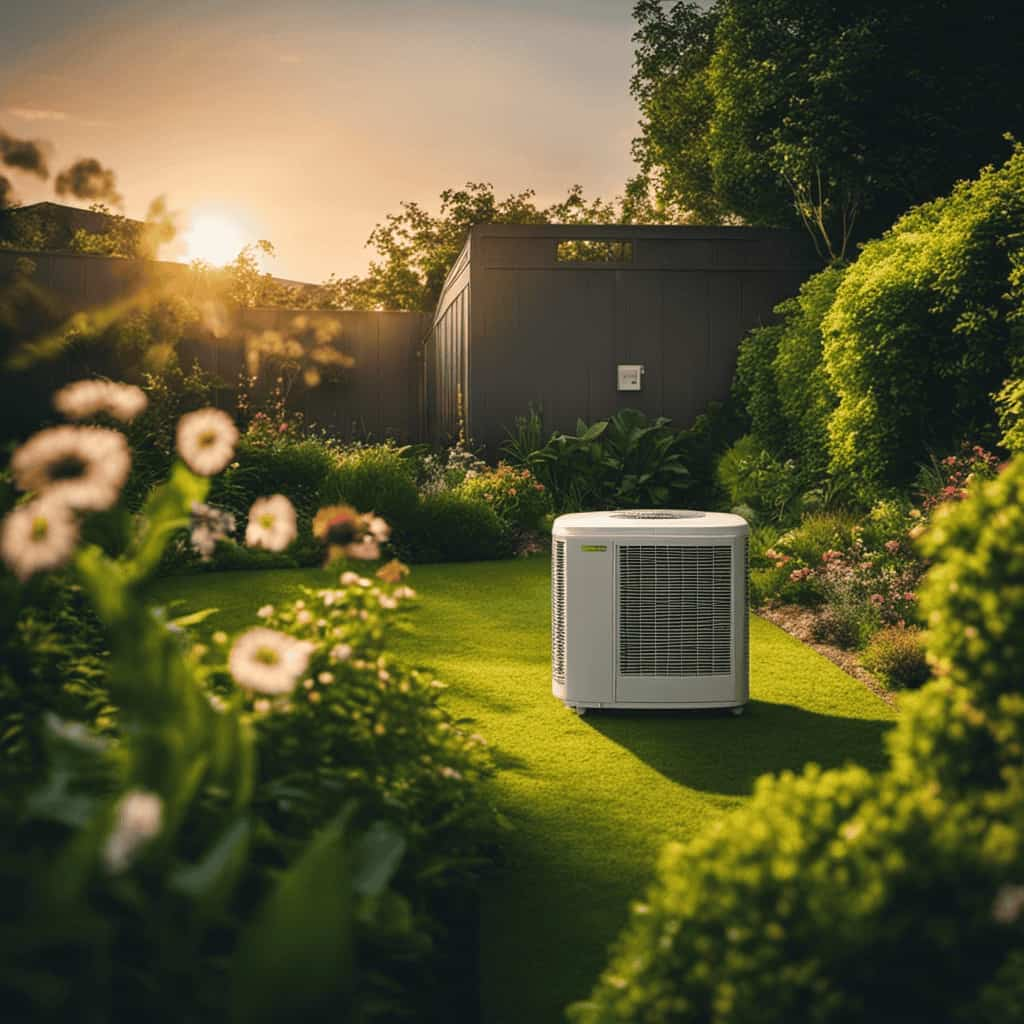
Here are our top choices for energy-efficient heat pump HVAC systems that will impress you.
These 5 stellar models feature advanced energy-saving features, cutting-edge technology, and high-performance efficiency.
With their top-rated energy efficiency ratings, you can be sure to save both energy and money.
Let’s dive into the world of these exceptional systems and discover the future of HVAC technology.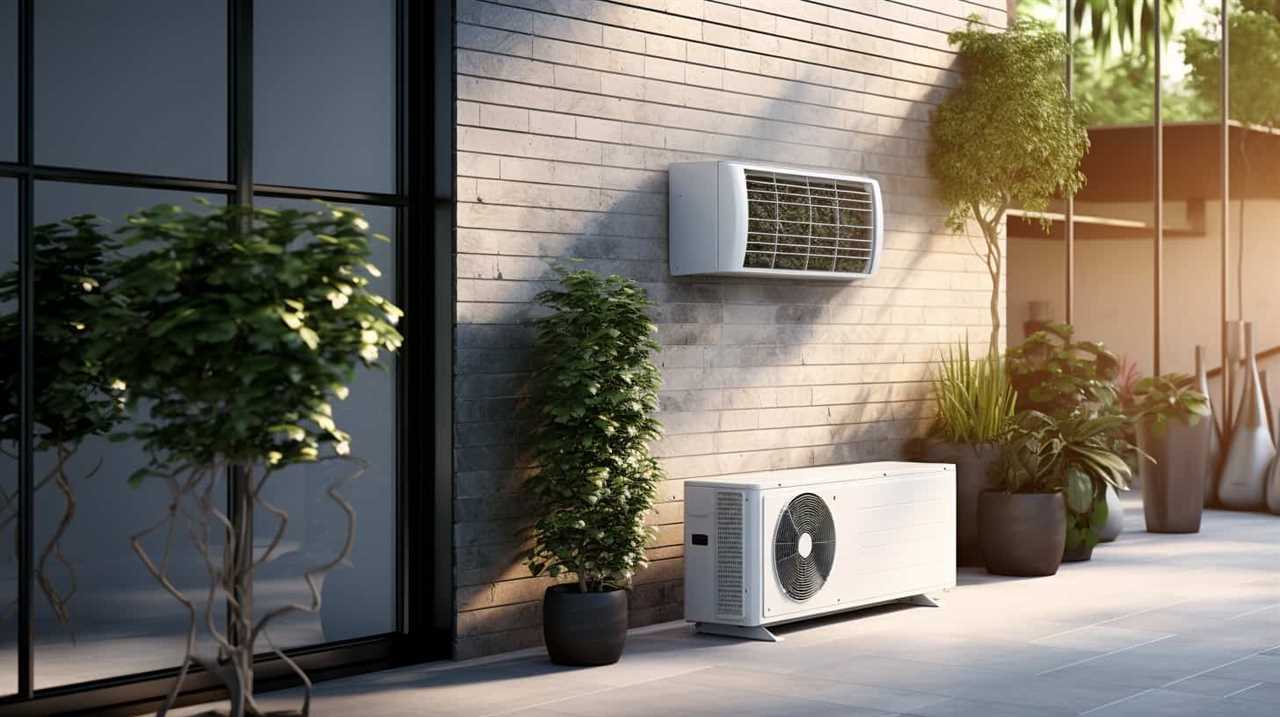
Key Takeaways
- Smart thermostat integration allows for seamless communication and remote temperature control, optimizing efficiency and reducing energy waste.
- Cutting-edge technology, such as smart thermostats, and the use of eco-friendly refrigerants contribute to exceptional cooling and heating performance while reducing energy consumption.
- Advanced heat pump technology utilizes state-of-the-art components and intelligent control systems, including variable-speed compressors and refrigerant flow optimization, for maximum energy efficiency.
- These high-performance energy-efficient systems can seamlessly integrate with smart home automation systems, allowing for remote control and monitoring of HVAC settings, optimizing temperature settings based on occupancy and weather conditions, and achieving significant cost savings.
Advanced Energy-Saving Features
We have identified three advanced energy-saving features that make our heat pump HVAC systems highly efficient.
The first feature is smart thermostat integration, which allows our systems to communicate and work seamlessly with compatible smart thermostats. By integrating the heat pump HVAC system with a smart thermostat, homeowners can easily control and adjust temperature settings remotely through their smartphones or other smart devices. This ensures that energy is only used when necessary, optimizing efficiency and reducing energy waste.
The second feature is programmable temperature settings, which allow users to set specific temperature schedules throughout the day. This feature enables homeowners to automatically adjust the temperature based on their daily routines, saving energy by reducing the need for manual adjustments.
Top-Rated Energy-Efficient Models
When it comes to top-rated energy-efficient models, we offer a range of options that are designed to optimize performance and reduce energy consumption.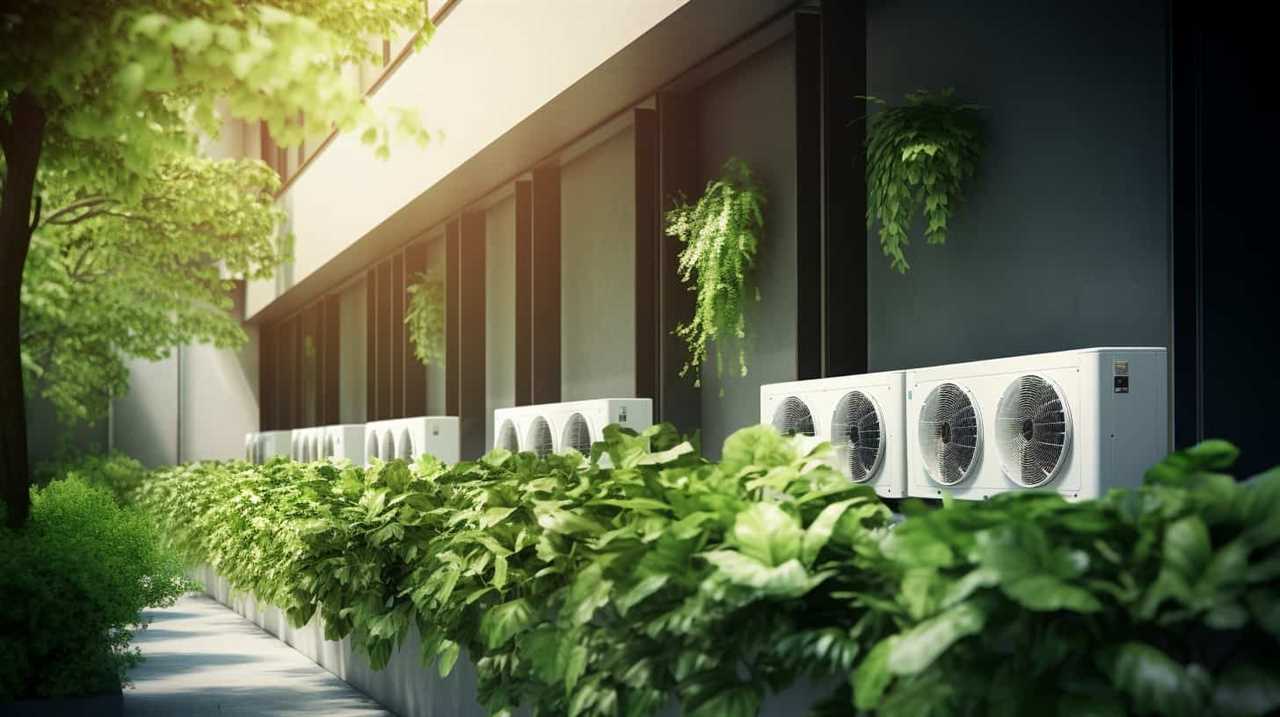
Our HVAC systems incorporate cutting-edge technology, such as smart thermostats, to ensure precise temperature control and energy savings. These smart thermostats allow users to program temperature settings based on their daily routines, thereby minimizing energy wastage when no one is at home.
Additionally, our models utilize eco-friendly refrigerants that have a lower environmental impact, while still delivering exceptional cooling and heating performance. The use of these environmentally friendly refrigerants helps to reduce greenhouse gas emissions and contribute to a more sustainable future.
With our top-rated energy-efficient models, you can enjoy optimal comfort while minimizing your carbon footprint.
Cutting-Edge Heat Pump Technology
Our cutting-edge heat pump technology utilizes advanced features and innovations to maximize energy efficiency and deliver optimal heating and cooling performance.

We’re committed to providing sustainable heating solutions that minimize environmental impact while optimizing comfort and cost savings.
Our innovative heat pump technology incorporates state-of-the-art components and intelligent control systems to achieve unparalleled efficiency.
By utilizing advanced heat exchange techniques, such as variable-speed compressors and refrigerant flow optimization, our heat pumps are able to extract and transfer heat effectively, even in extreme weather conditions.
Additionally, our systems employ smart algorithms and real-time monitoring to automatically adjust performance based on weather patterns and indoor temperature fluctuations.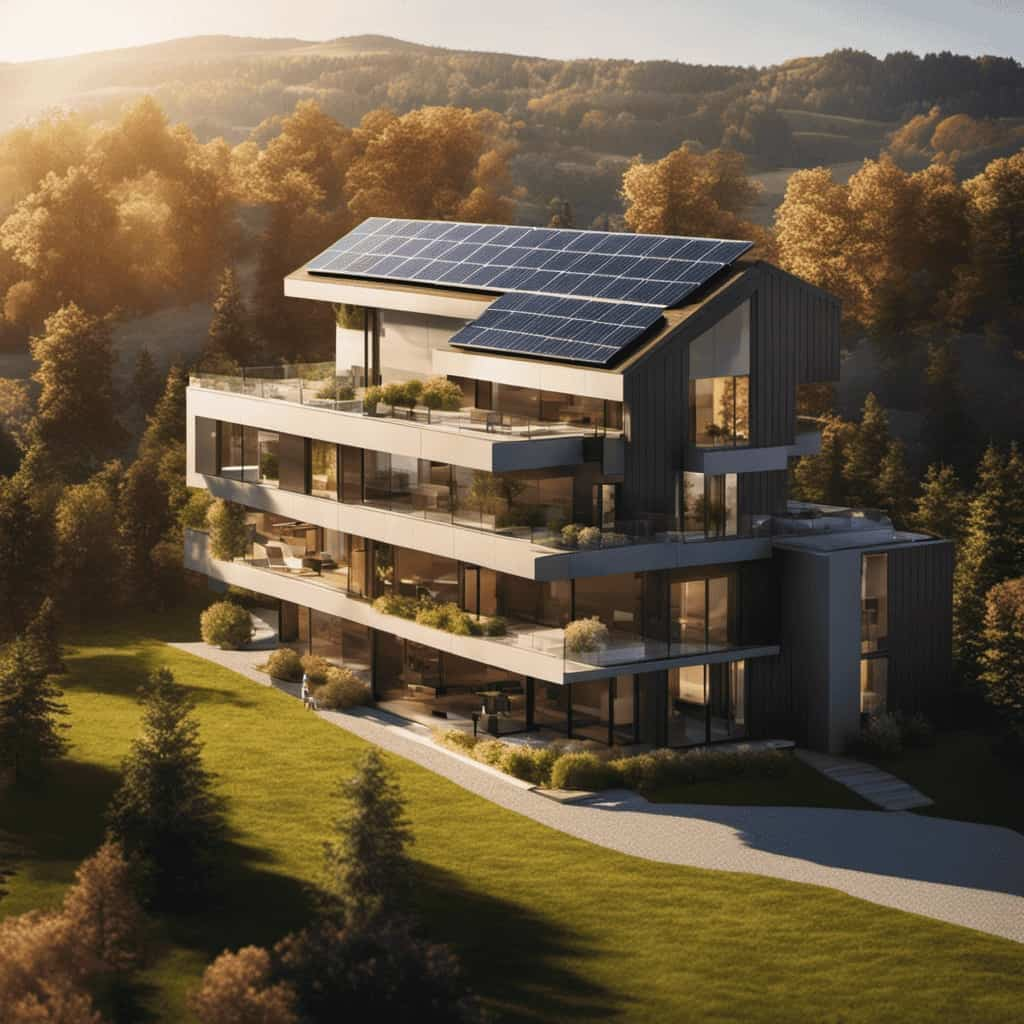
This ensures that our heat pumps operate at peak efficiency at all times, resulting in significant energy savings and a reduced carbon footprint.
High-Performance Energy-Efficient Systems
Our high-performance energy-efficient systems utilize advanced technology to maximize heating and cooling efficiency, ensuring optimal comfort and cost savings. These systems offer several key features that make them stand out in the market:
Smart Home Integration: Our systems can seamlessly integrate with smart home automation systems, allowing users to control and monitor their HVAC settings remotely. This not only provides convenience but also ensures energy efficiency by optimizing temperature settings based on occupancy and weather conditions.
Cost-Effective Solutions: Our systems are designed to provide maximum energy efficiency, resulting in significant cost savings for homeowners. By using advanced heat pump technology, these systems can extract heat from the air or ground and transfer it to the indoor space efficiently, reducing energy consumption and lowering utility bills.
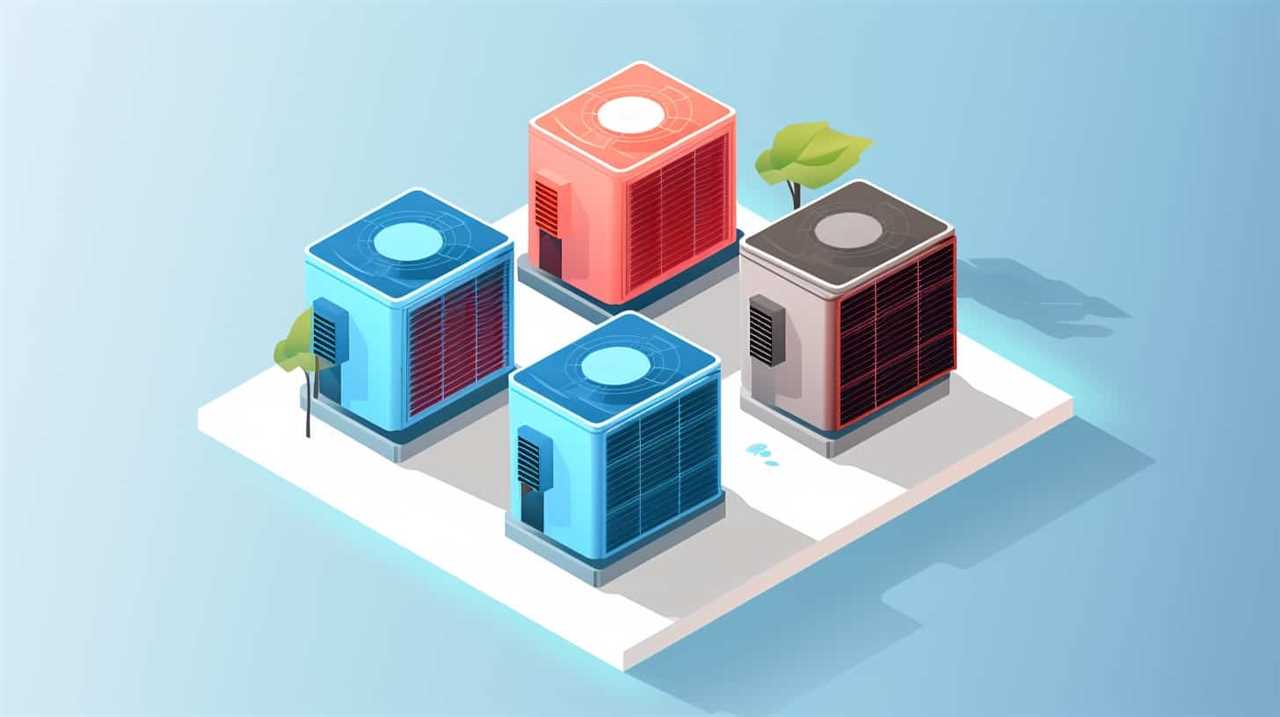
Advanced Controls: Our systems come equipped with advanced control features that allow for precise temperature adjustments and scheduling. This ensures that the HVAC system operates at its highest efficiency levels while maintaining optimal comfort levels for the occupants.
With these features, our high-performance energy-efficient systems offer a perfect blend of comfort, convenience, and cost savings for homeowners.
Best-in-Class Energy Efficiency Ratings
We have achieved best-in-class energy efficiency ratings, ensuring that our systems are among the most efficient in the market. Our heat pump HVAC systems are designed to optimize energy consumption and reduce waste.
Through advanced technology and engineering, we’ve incorporated smart thermostat integration into our systems. This allows users to have precise control over their HVAC settings, maximizing energy efficiency and comfort.
Additionally, our commitment to energy efficiency aligns with government initiatives and incentives. By using our systems, customers may be eligible to receive government energy efficiency incentives, further reducing their environmental impact and energy costs.
Our best-in-class energy efficiency ratings, combined with smart thermostat integration and government incentives, make our heat pump HVAC systems the ideal choice for those seeking both comfort and sustainability.
Frequently Asked Questions
What Is the Average Cost of Installing a Stellar Energy-Efficient Heat Pump HVAC System?
The average cost of installing a stellar energy-efficient heat pump HVAC system can vary depending on factors such as the size of the property and the specific system chosen. A cost estimate can be provided by a professional HVAC contractor. However, it is important to consider the long-term energy savings that can be achieved with such a system.
Are There Any Government Incentives or Rebates Available for Purchasing an Energy-Efficient Heat Pump HVAC System?
There are government incentives and rebates available for purchasing energy-efficient heat pump HVAC systems. These incentives aim to promote energy savings and encourage the adoption of more sustainable heating and cooling solutions.
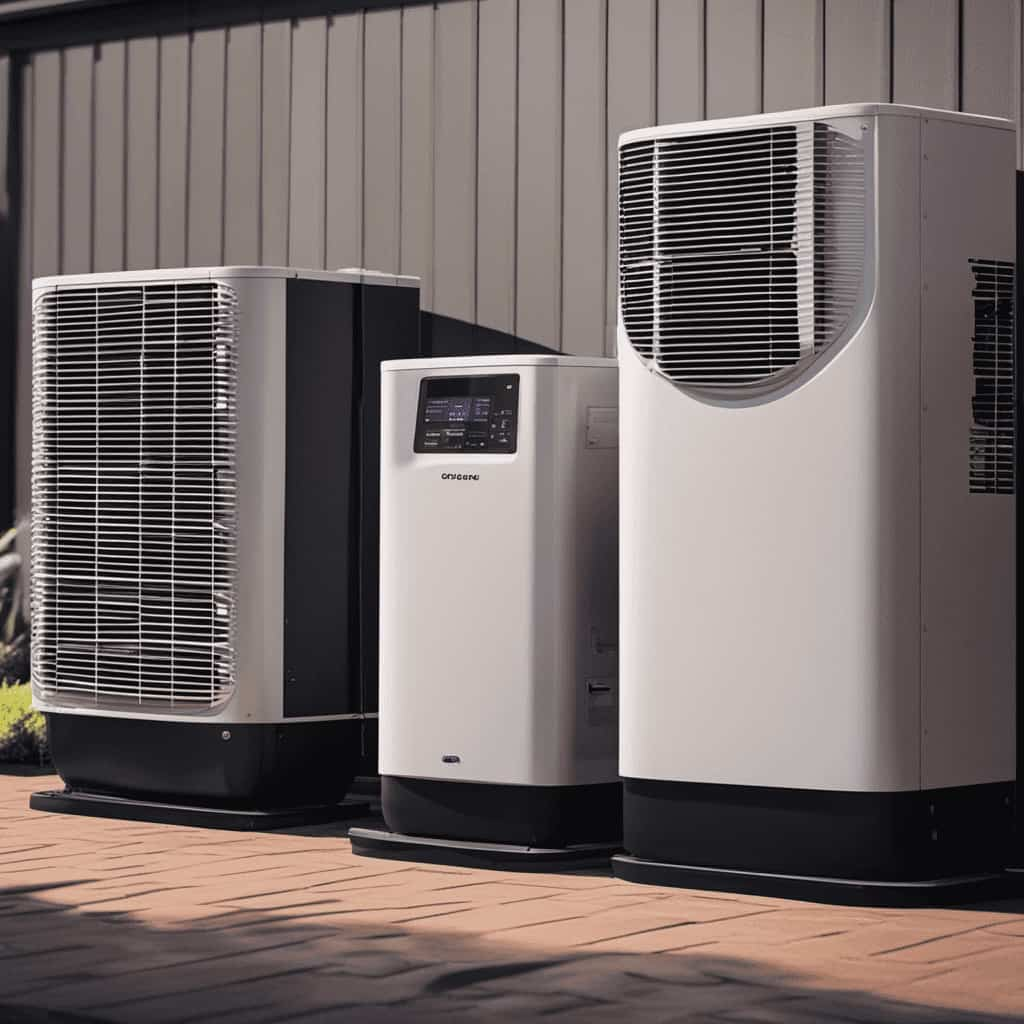
Can a Stellar Energy-Efficient Heat Pump HVAC System Be Integrated With Smart Home Technology?
Yes, a stellar energy-efficient heat pump HVAC system can be integrated with smart home technology. This integration offers several benefits, such as remote control, energy monitoring, and optimized scheduling for efficient operation.
How Often Does a Stellar Energy-Efficient Heat Pump HVAC System Require Maintenance and What Are the Associated Costs?
Stellar energy-efficient heat pump HVAC systems require regular maintenance to ensure optimal performance. The frequency of maintenance depends on factors such as usage and manufacturer recommendations. Associated costs may include professional servicing and replacement of parts, if needed.
Are There Any Limitations or Specific Requirements for Installing a Stellar Energy-Efficient Heat Pump HVAC System in Older Homes or Buildings?
Installing energy-efficient heat pump HVAC systems in older homes or buildings may have limitations and specific requirements. These can include ensuring proper insulation, electrical capacity, and ductwork modifications for optimal performance and efficiency.
What Are the Sustainable Benefits of Energy-Efficient Heat Pump Systems?
What Are the Sustainable Benefits of Energy-Efficient Heat Pump Systems? Energy-efficient heat pump systems offer a wide range of sustainable benefits. By utilizing renewable energy sources, such as air, groundwater, or soil, heat pumps can significantly reduce greenhouse gas emissions. Their high energy efficiency results in reduced electricity usage, saving both resources and costs. Additionally, heat pumps provide efficient heating and cooling, promoting a comfortable indoor environment while minimizing environmental impact. These sustainable benefits of heat pump systems contribute to a greener and more eco-friendly future.
Conclusion
In conclusion, these five heat pump HVAC systems offer advanced energy-saving features, top-rated efficiency models, cutting-edge technology, high-performance systems, and best-in-class energy efficiency ratings.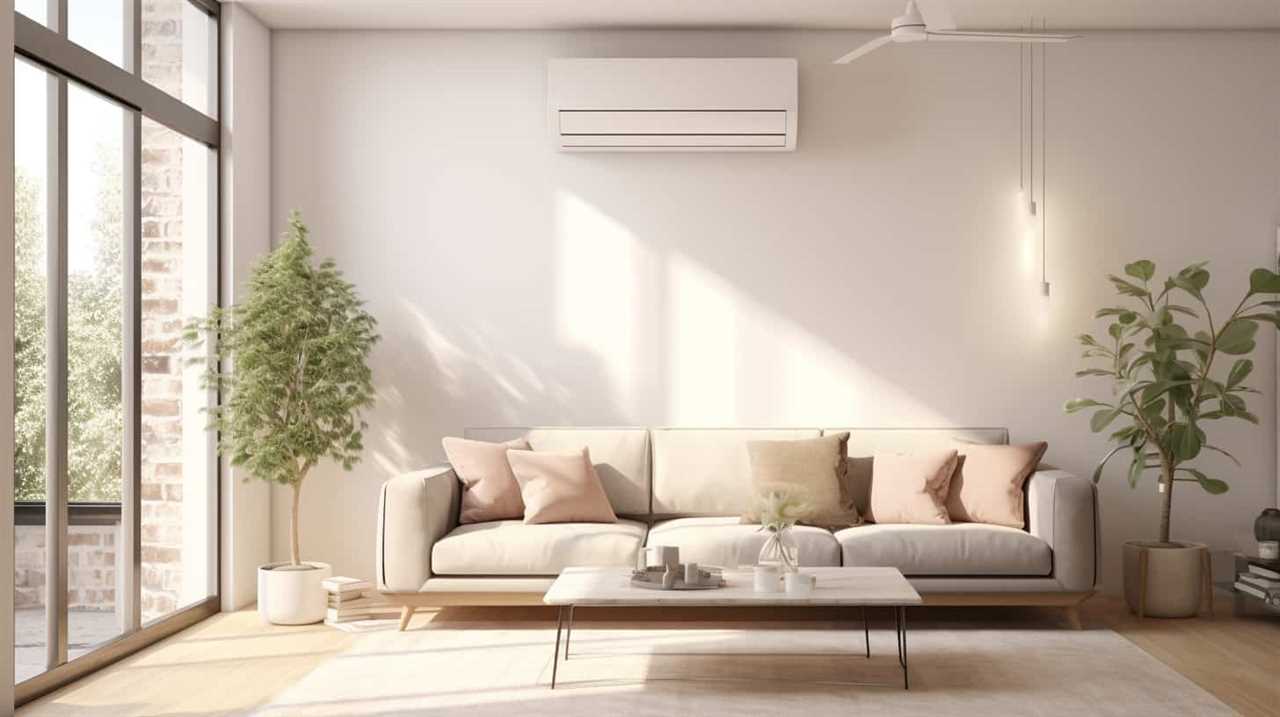
They’re like the superheroes of energy-efficient heating and cooling, efficiently saving energy while maintaining optimal comfort levels.
With these stellar options, homeowners can take a step towards a greener future without compromising on performance.
Renewable Energy Sources
Unveiling Top Energy-Saving Heat Pump HVAC Systems
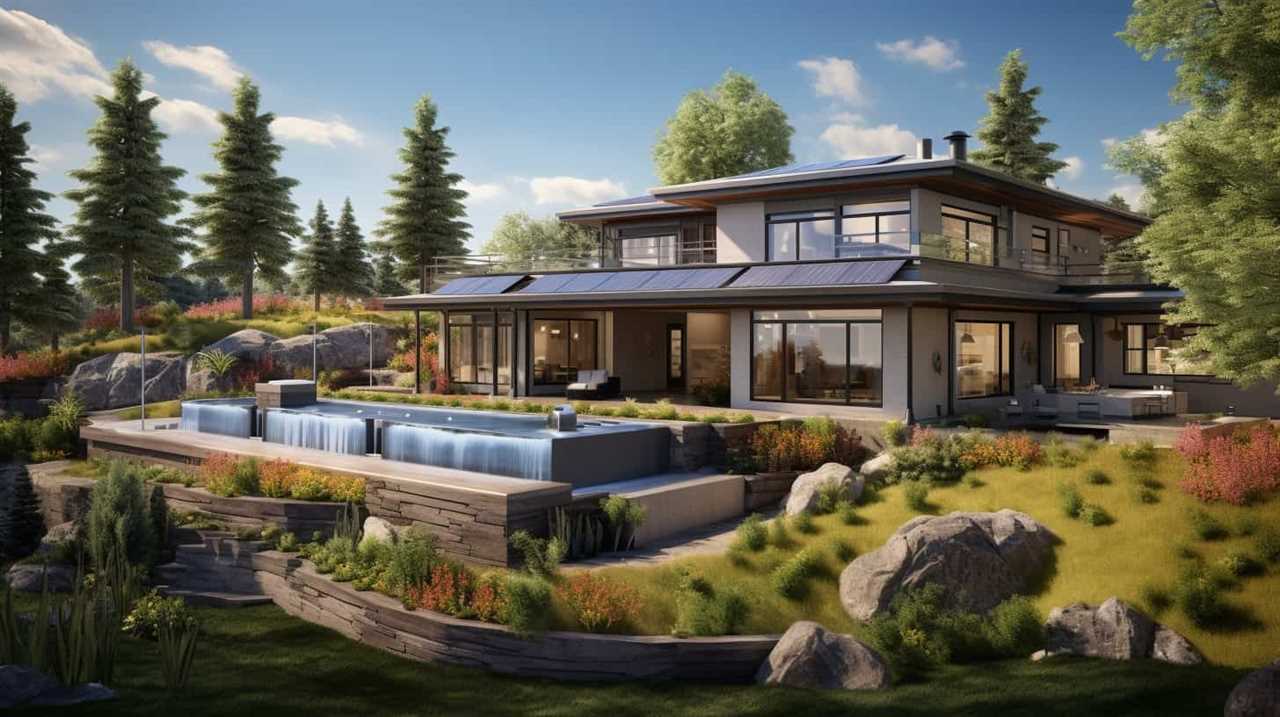
We have some exciting news to share with you! Prepare to explore the best energy-efficient heat pump HVAC systems available on the market.
In this article, we’ll unveil the latest technology that can save you both energy and money. From factors to consider when choosing a system to real-life case studies, we’ve got you covered.
So, join us as we dive into the world of energy efficiency and explore how you can maximize savings with your heat pump HVAC system.
Let’s get started!
Key Takeaways
- Prioritize cost-effective HVAC solutions
- Consider the system’s energy efficiency rating (SEER and HSPF)
- Opt for systems that use environmentally friendly refrigerants
- Evaluate the overall cost of installation, maintenance, and operation
Factors to Consider When Choosing an Energy-Saving Heat Pump HVAC System
Let’s explore the factors we should consider when choosing an energy-saving heat pump HVAC system.
When it comes to energy-saving heat pump technology, it’s crucial to prioritize cost-effective HVAC solutions. Firstly, consider the system’s energy efficiency rating, indicated by the Seasonal Energy Efficiency Ratio (SEER) and Heating Seasonal Performance Factor (HSPF). Higher ratings signify better energy efficiency and lower operating costs.
Additionally, pay attention to the size of the heat pump system. An undersized unit may struggle to heat or cool your space effectively, while an oversized one can lead to unnecessary energy consumption.
Furthermore, consider the type of refrigerant used in the heat pump. Opt for systems that use environmentally friendly and energy-efficient refrigerants such as R-410A.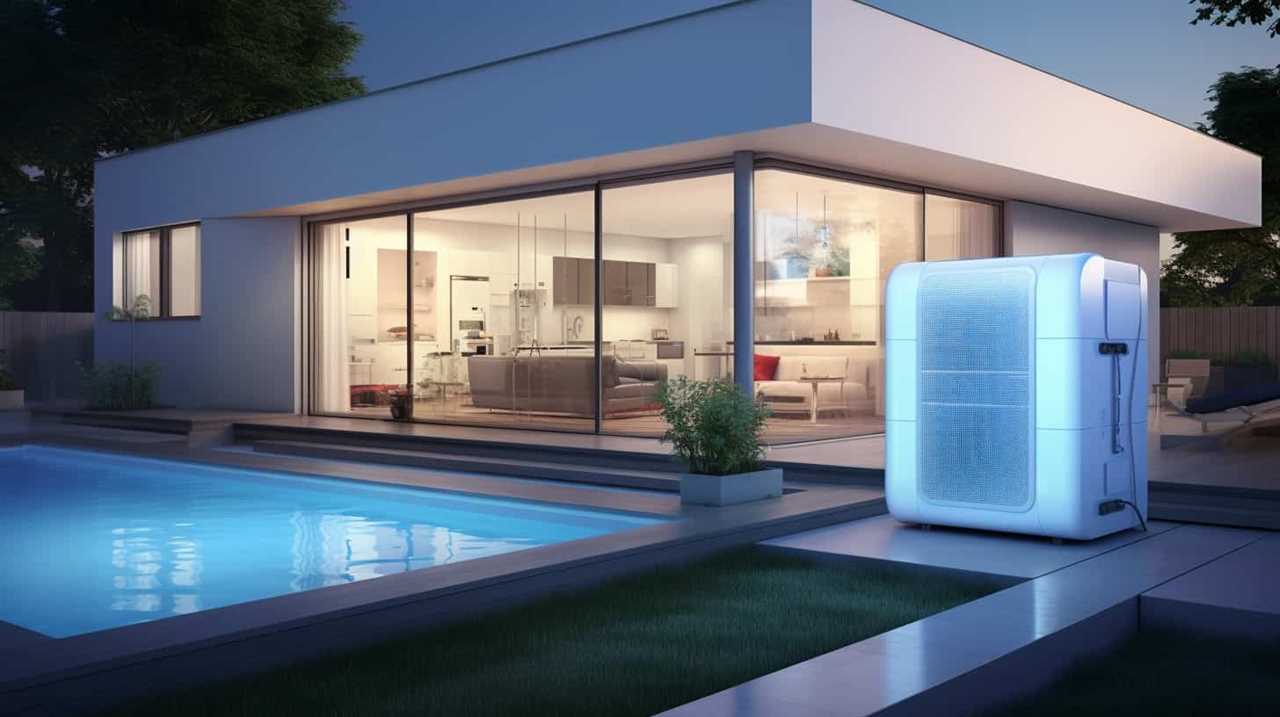
Lastly, evaluate the overall cost of installation, maintenance, and operation to ensure long-term cost-effectiveness.
Top-rated Heat Pump HVAC Systems for Energy Efficiency
We have identified the top-rated heat pump HVAC systems for energy efficiency. These systems offer significant advantages over traditional HVAC systems, making them a popular choice for homeowners looking to save energy and reduce their carbon footprint. Here are the top three heat pump HVAC systems for energy efficiency:
Carrier Infinity 20 Heat Pump: This system boasts an impressive SEER rating of up to 20.5 and an HSPF rating of up to 13. This high efficiency translates to significant energy savings and lower utility bills.
Trane XV20i Variable Speed Heat Pump: With a SEER rating of up to 21 and an HSPF rating of up to 10, this system is designed for optimal energy efficiency. Its variable speed technology allows for precise temperature control and enhanced comfort.

Lennox XP25 Heat Pump: This system offers a SEER rating of up to 23.5 and an HSPF rating of up to 10.2. It utilizes advanced technologies, such as the SunSource® solar-ready option, to maximize energy savings.
These top-rated heat pump HVAC systems not only provide exceptional energy efficiency but also qualify for government incentives.
Transitioning into the benefits of using energy-saving heat pump HVAC systems, let’s explore how these systems can help homeowners save money and reduce their environmental impact.
Benefits of Using Energy-Saving Heat Pump HVAC Systems
Using energy-saving heat pump HVAC systems offers numerous benefits, including lower energy bills and reduced environmental impact. Heat pump technology is designed to efficiently transfer heat from one location to another, providing both heating and cooling capabilities. This technology can significantly reduce energy consumption compared to traditional HVAC systems.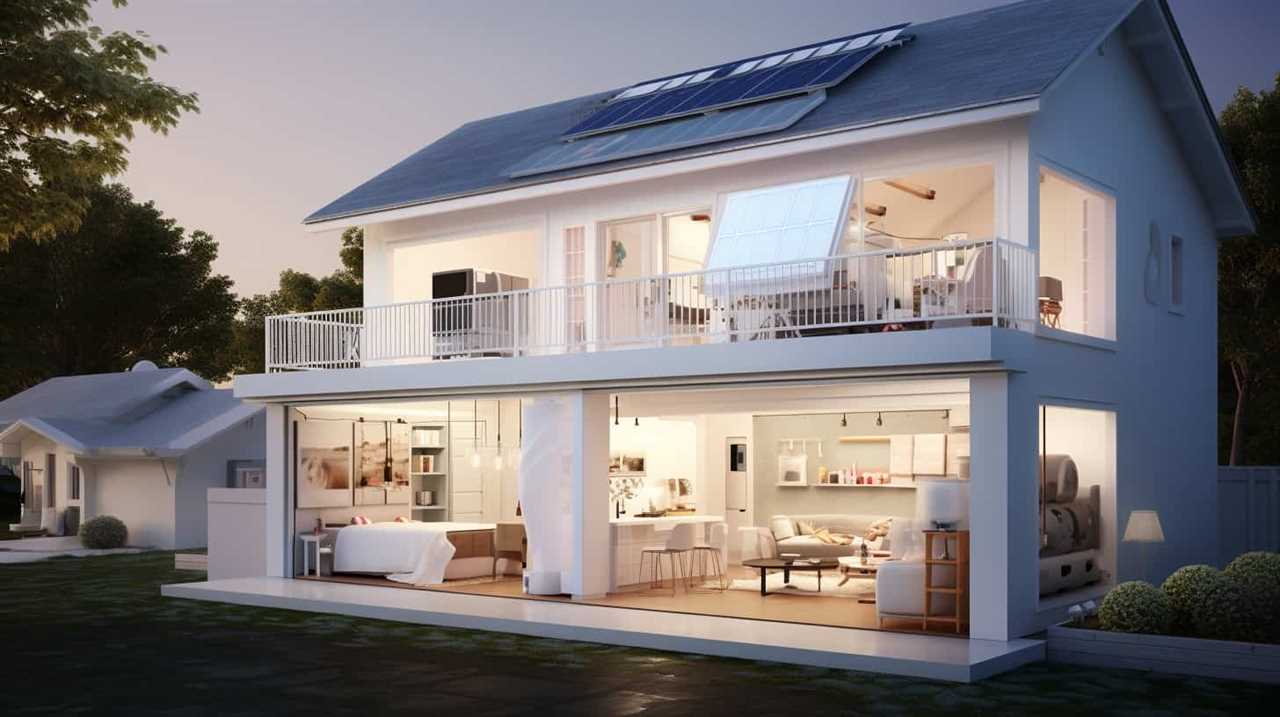
To illustrate the cost effectiveness of heat pump systems, consider the following table:
| Benefit | Explanation |
|---|---|
| Lower Energy Bills | Heat pumps use less energy to produce the same amount of heating or cooling, resulting in lower utility bills. |
| Reduced Environmental Impact | Heat pumps produce fewer greenhouse gas emissions and have a smaller carbon footprint compared to conventional heating and cooling systems. |
| Long Lifespan | Heat pump systems typically have a longer lifespan compared to traditional HVAC systems, reducing the need for frequent replacements. |
| Versatility | Heat pumps can provide both heating and cooling, eliminating the need for separate systems and reducing installation and maintenance costs. |
How to Maximize Energy Savings With Your Heat Pump HVAC System
To achieve maximum energy savings with our heat pump HVAC system, we should carefully regulate temperature settings and regularly maintain the equipment. Here are some tips for maintaining heat pump efficiency and avoiding common mistakes that reduce energy savings:
Set the temperature wisely: Keep the thermostat at a moderate temperature to prevent excessive energy consumption. A difference of just 1 degree Celsius can save up to 10% on your energy bill.
Use programmable thermostats: Take advantage of programmable thermostats to automatically adjust the temperature based on your schedule. This ensures that the system isn’t running unnecessarily when you’re away.
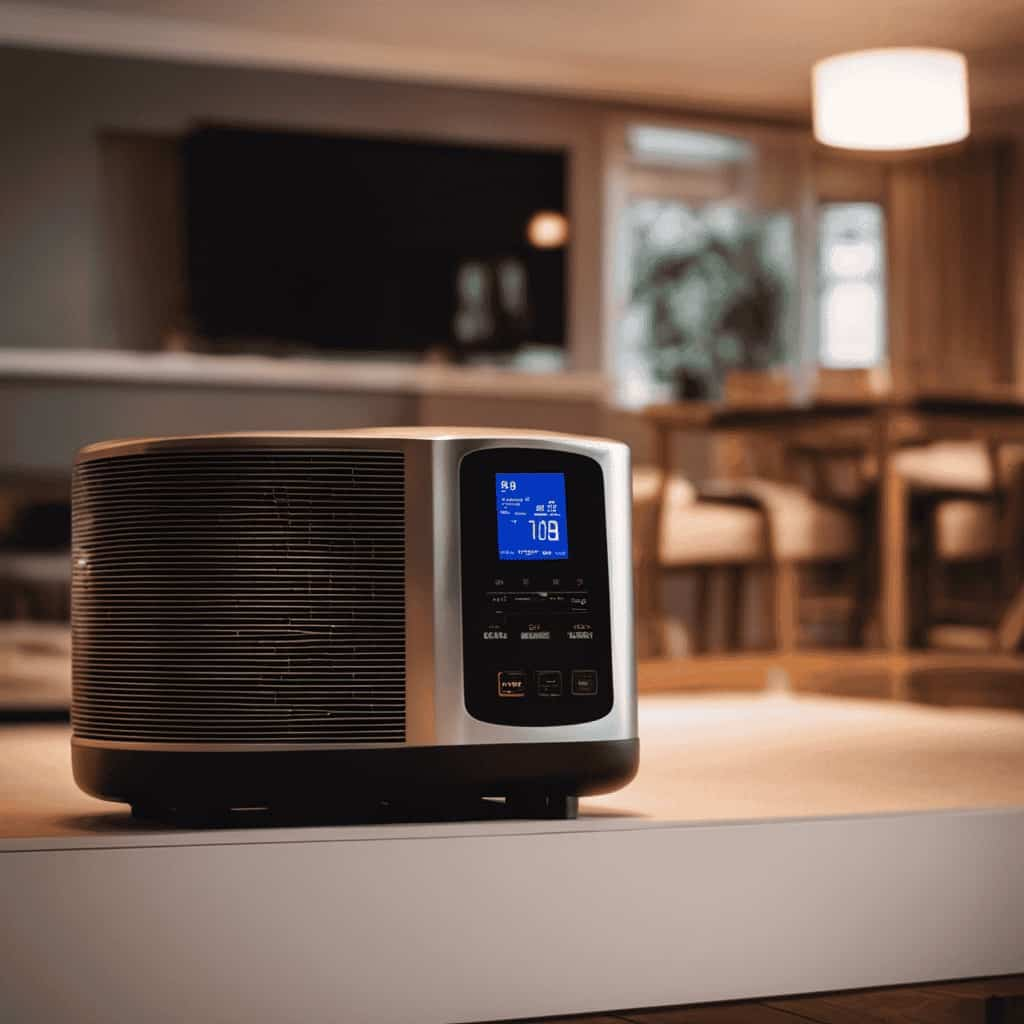
Regularly clean and replace filters: Dirty filters restrict airflow and reduce efficiency. Clean or replace them every 1-3 months to maintain optimal performance.
Case Studies: Real-life Examples of Energy-Saving Heat Pump HVAC Systems
One example of an energy-saving heat pump HVAC system is a residential building in New York City that saw a 30% reduction in energy consumption after installing a high-efficiency heat pump system.
This real-life implementation showcases the potential of energy-saving technology advancements in the HVAC industry. By utilizing a heat pump system with advanced energy-saving features, such as variable speed compressors and intelligent controls, the building was able to significantly reduce its energy usage.
The high-efficiency heat pump system effectively transferred heat from the outdoor environment to heat the building during the colder months and removed heat from the indoor environment to cool the building during the hotter months.

This case study demonstrates the tangible benefits of implementing energy-saving heat pump HVAC systems in real-world scenarios, paving the way for more sustainable and cost-effective heating and cooling solutions.
Frequently Asked Questions
What Is the Average Cost of Installing an Energy-Saving Heat Pump HVAC System?
The average cost of installing an energy-saving heat pump HVAC system varies depending on factors such as the size of the system and the complexity of the installation process.
Are There Any Government Incentives or Rebates Available for Purchasing an Energy-Saving Heat Pump HVAC System?
Yes, there are government incentives and rebates available for purchasing energy-saving heat pump HVAC systems. These incentives and rebates aim to promote energy efficiency and help homeowners offset the cost of installation.
Can an Energy-Saving Heat Pump HVAC System Be Used in Both Residential and Commercial Buildings?
Yes, energy-saving heat pump HVAC systems can be used in both residential and commercial buildings. They offer benefits such as energy efficiency and cost savings, but there may be drawbacks depending on the specific application.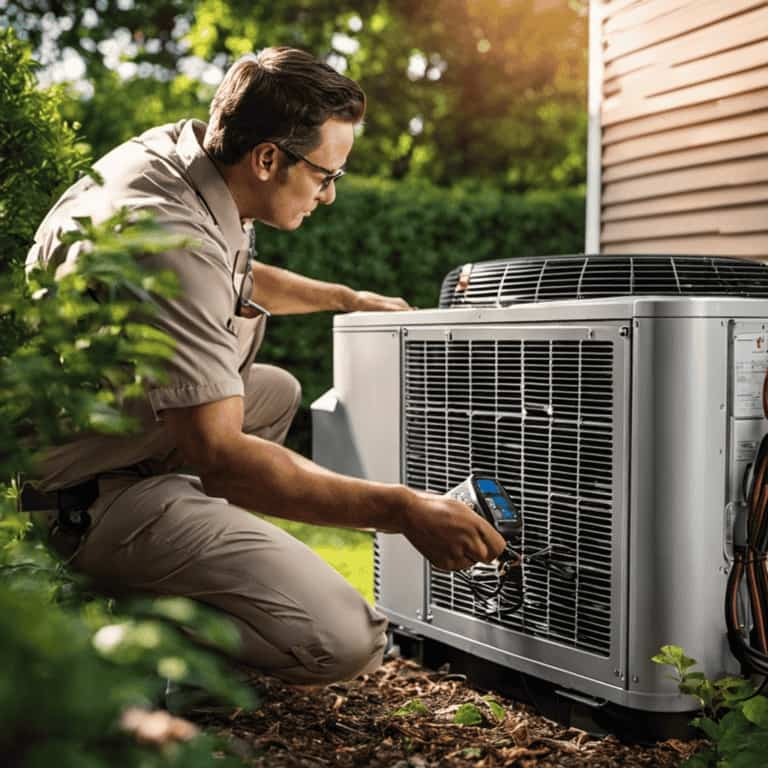
Are There Any Maintenance Requirements for an Energy-Saving Heat Pump HVAC System?
Maintenance requirements for energy-saving heat pump HVAC systems include regular filter changes, cleaning coils, and checking refrigerant levels. These tasks ensure optimal performance and energy-efficient operation, extending the lifespan of the system.
What Is the Expected Lifespan of an Energy-Saving Heat Pump HVAC System?
The expected lifespan of an energy-saving heat pump HVAC system can vary, but on average it can last between 15 to 20 years. The cost of installation should be considered when determining its overall value.
What are the Advantages of Heat Pumps for Residential Heating?
Future residential heating with heat pumps offers numerous advantages. Firstly, heat pumps are highly efficient, providing whole-home heating at a fraction of the cost of traditional heating systems. Secondly, they offer versatile cooling capabilities during hot weather. Additionally, heat pumps are eco-friendly, as they generate low greenhouse gas emissions. Lastly, heat pump technology is constantly evolving, offering improved energy efficiency and increased savings in the long run.
Conclusion
In conclusion, choosing an energy-saving heat pump HVAC system can lead to significant savings in energy consumption and costs. These top-rated systems offer high levels of efficiency and can greatly benefit both residential and commercial properties.
By maximizing energy savings through proper usage and maintenance, users can enjoy the advantages of reduced carbon footprint and increased comfort.
With these systems, the future of HVAC technology looks bright, providing a more sustainable and eco-friendly solution for heating and cooling needs.
Renewable Energy Sources
Top 5 Sustainable Benefits of Heat Pump Technology

We are eager to share with you the top 5 sustainable benefits of heat pump technology.
With heat pumps, we can save energy, reduce carbon emissions, and tap into renewable energy sources.
Plus, we’ll enjoy cost savings and a positive environmental impact.
Join us as we explore the incredible advantages of this technology and how it can serve us and our planet.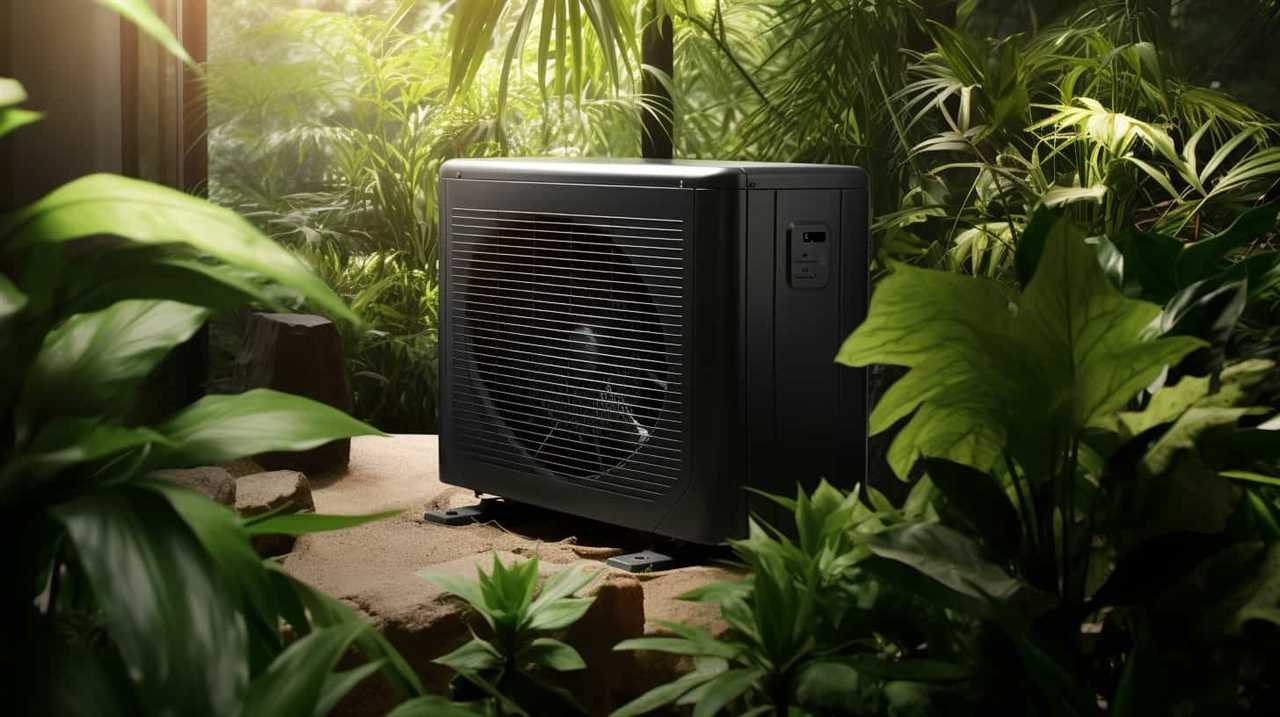
Let’s dive in and discover a greener future together.
Key Takeaways
- Heat pumps optimize performance through smart controls, reducing energy waste and lowering utility bills.
- Heat pumps contribute to reduced carbon emissions, making them a sustainable solution.
- Heat pumps tap into geothermal energy, reducing reliance on non-renewable resources.
- Heat pumps significantly reduce energy costs over time through efficient heating and cooling capabilities.
Energy Efficiency
We believe that heat pump technology offers significant improvements in energy efficiency. By utilizing smart controls, heat pumps can optimize their performance, ensuring that energy is used only when necessary. This not only reduces energy waste but also lowers utility bills, making it a cost-effective long-term investment.
Heat pumps are designed to transfer heat from one place to another, rather than generating it, which makes them highly efficient. They extract heat from the air, ground, or water, and distribute it throughout a building. This process requires much less energy compared to traditional heating and cooling systems.
With their high efficiency, heat pumps contribute to reduced carbon emissions, making them a sustainable solution for serving both the environment and the community.
Reduced Carbon Emissions
Heat pump technology reduces carbon emissions by efficiently transferring heat and minimizing energy waste. This results in a significant reduction in our carbon footprint and contributes to environmental sustainability.
By using heat pumps, we can decrease our reliance on fossil fuels, which are the primary source of carbon emissions. Heat pumps use electricity to move heat instead of generating it, making them a more environmentally friendly alternative.
They extract heat from the air, ground, or water and distribute it to keep our homes warm in the winter and cool in the summer. This process not only reduces our carbon emissions but also helps to conserve energy and promote a greener future.
With heat pump technology, we can make a positive impact on the environment while enjoying comfortable living spaces.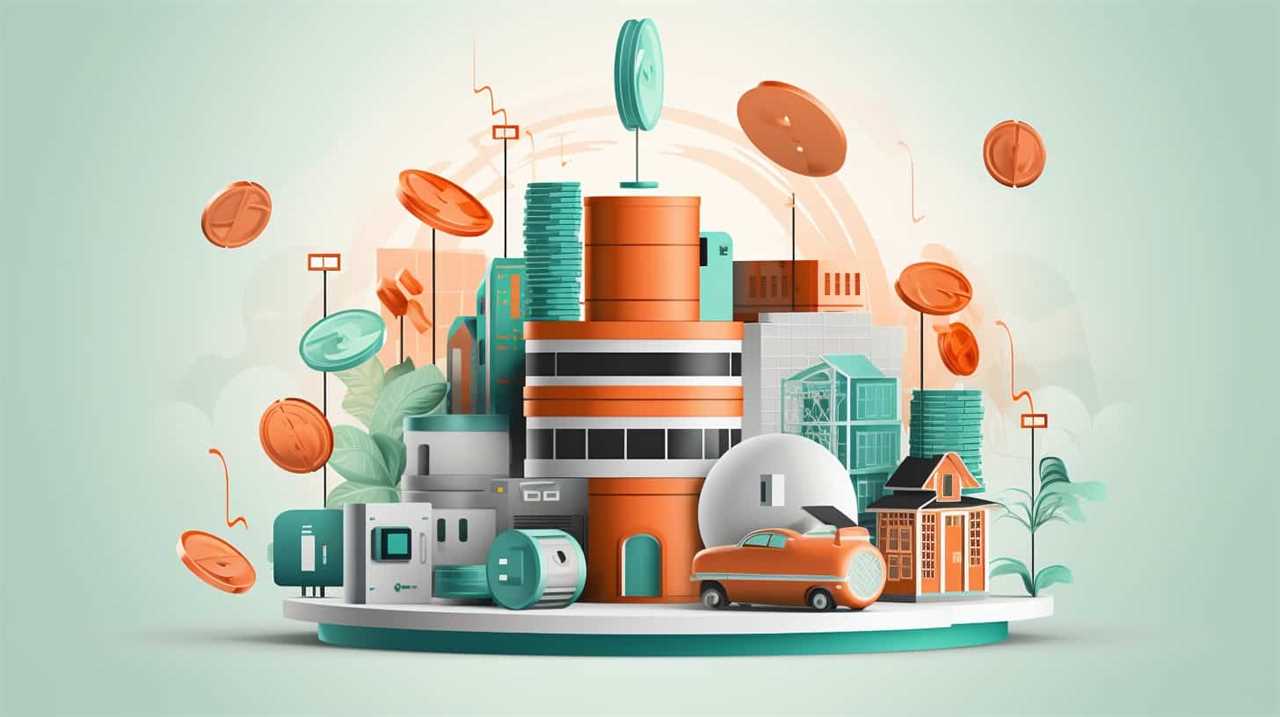
Renewable Energy Source
Using heat pump technology allows us to tap into a renewable energy source, reducing our reliance on non-renewable resources and promoting a more sustainable future.
Heat pumps utilize geothermal energy, which is a green technology that harnesses the heat stored beneath the Earth’s surface. By extracting heat from the ground or water, heat pumps can provide heating, cooling, and hot water for our homes and buildings.
This renewable energy source has numerous benefits, including lower carbon emissions, reduced energy consumption, and lower utility bills. Furthermore, geothermal energy is abundant and readily available, making it a reliable and long-lasting solution for our energy needs.
Cost Savings
With heat pump technology, we can significantly reduce our energy costs over time by taking advantage of its efficient and cost-effective heating and cooling capabilities. Heat pumps consume less energy compared to traditional heating and cooling systems, resulting in lower utility bills. This makes it an excellent long-term investment for those who desire to save money while serving others.

By reducing energy consumption, heat pumps not only benefit our wallets but also the environment. They produce fewer greenhouse gas emissions, contributing to a cleaner and healthier planet. So, not only can we enjoy the immediate cost savings, but we can also feel good about the long-term positive impact on the environment.
Now, let’s explore the next topic: the environmental impact of heat pump technology.
Environmental Impact
By considering the environmental impact, we can see how heat pump technology offers a sustainable solution for reducing our carbon footprint. Here are four reasons why heat pumps are environmentally friendly:
Reduced Energy Consumption: Heat pumps are highly efficient in converting energy, resulting in reduced energy consumption compared to traditional heating and cooling systems. This lowers our ecological footprint by conserving resources.

Lower Carbon Emissions: Heat pumps generate heat by extracting it from renewable sources such as the air or ground. This means they produce fewer carbon emissions, contributing to climate change mitigation.
Decreased Fossil Fuel Dependency: Heat pumps rely on electricity rather than fossil fuels such as natural gas or oil. By shifting to heat pump technology, we reduce our dependency on finite fossil fuel resources.
Improved Air Quality: Heat pumps don’t burn fuel to create heat, which means there’s no combustion process releasing harmful pollutants into the air. This improves indoor and outdoor air quality, benefiting our health and the environment.
Frequently Asked Questions
How Does the Energy Efficiency of Heat Pump Technology Compare to Traditional Heating and Cooling Systems?
The energy efficiency of heat pump technology is significantly higher compared to traditional heating and cooling systems, resulting in lower energy costs. This makes heat pumps a cost-effective and sustainable solution for serving others.
What Are Some of the Potential Environmental Impacts of Heat Pump Technology, Aside From Reduced Carbon Emissions?
Potential environmental impacts of heat pump technology, aside from reduced carbon emissions, include decreased air pollution, conservation of natural resources, and a smaller carbon footprint. These benefits contribute to a more sustainable future for all.
Can Heat Pump Technology Be Used in Conjunction With Other Renewable Energy Sources, Such as Solar Panels or Wind Turbines?
Yes, heat pump technology can be used in conjunction with other renewable energy sources like solar panels or wind turbines. Combining them brings multiple benefits such as increased energy efficiency and reduced reliance on non-renewable resources.
Are There Any Government Incentives or Tax Credits Available for Installing a Heat Pump System?
There are government incentives and tax credits available for installing a heat pump system. These incentives can help offset the cost of installation and make it more affordable for homeowners.
How Does the Initial Cost of Purchasing and Installing a Heat Pump System Compare to Traditional Heating and Cooling Systems?
When comparing the initial cost of purchasing and installing a heat pump system to traditional heating and cooling systems, we found that while heat pumps may have a higher upfront cost, the long-term cost savings make them a more sustainable choice.
How Does Heat Pump Technology Contribute to Green Heating?
Heat pump technology plays a pivotal role in achieving green heating impact & efficiency. By extracting heat from the air or ground, heat pumps transfer it indoors, significantly reducing reliance on traditional fossil fuel-based heating systems. This eco-friendly solution not only minimizes carbon emissions but also enhances energy efficiency, making it a sustainable choice for residential and commercial heating needs.
Conclusion
In conclusion, heat pump technology offers a multitude of sustainable benefits that make it a game-changer in the world of energy.
By harnessing renewable energy sources and maximizing energy efficiency, heat pumps not only reduce carbon emissions but also contribute to significant cost savings.
They’re like a breath of fresh air, breathing new life into our efforts to combat climate change and create a greener future for generations to come.
-

 Residential and Commercial Applications2 days ago
Residential and Commercial Applications2 days agoBest Amana Heat Pump Reviews
-

 Thermal Energy Transfer5 days ago
Thermal Energy Transfer5 days agoBreakthroughs in Modern Heat Pump Systems: Thermal Energy Edition
-

 Residential and Commercial Applications2 days ago
Residential and Commercial Applications2 days agoBest Heat Pump
-

 Geothermal Heat Pumps3 months ago
Geothermal Heat Pumps3 months agoUpgrade Your Comfort with Our Efficient HVAC Systems
-

 Air Conditioning2 months ago
Air Conditioning2 months agoExploring Energy-Efficient Air Conditioning Heat Pumps
-

 Geothermal Heat Pumps3 months ago
Geothermal Heat Pumps3 months agoInnovative Geothermal Heat Pump Manufacturers Revolutionize Energy Efficiency
-

 Thermal Energy Transfer4 weeks ago
Thermal Energy Transfer4 weeks agoBoost Your Heat Pump Efficiency: Interactive Guide
-

 Residential and Commercial Applications2 days ago
Residential and Commercial Applications2 days agoBest Portable Heat Pump Heat & AC










